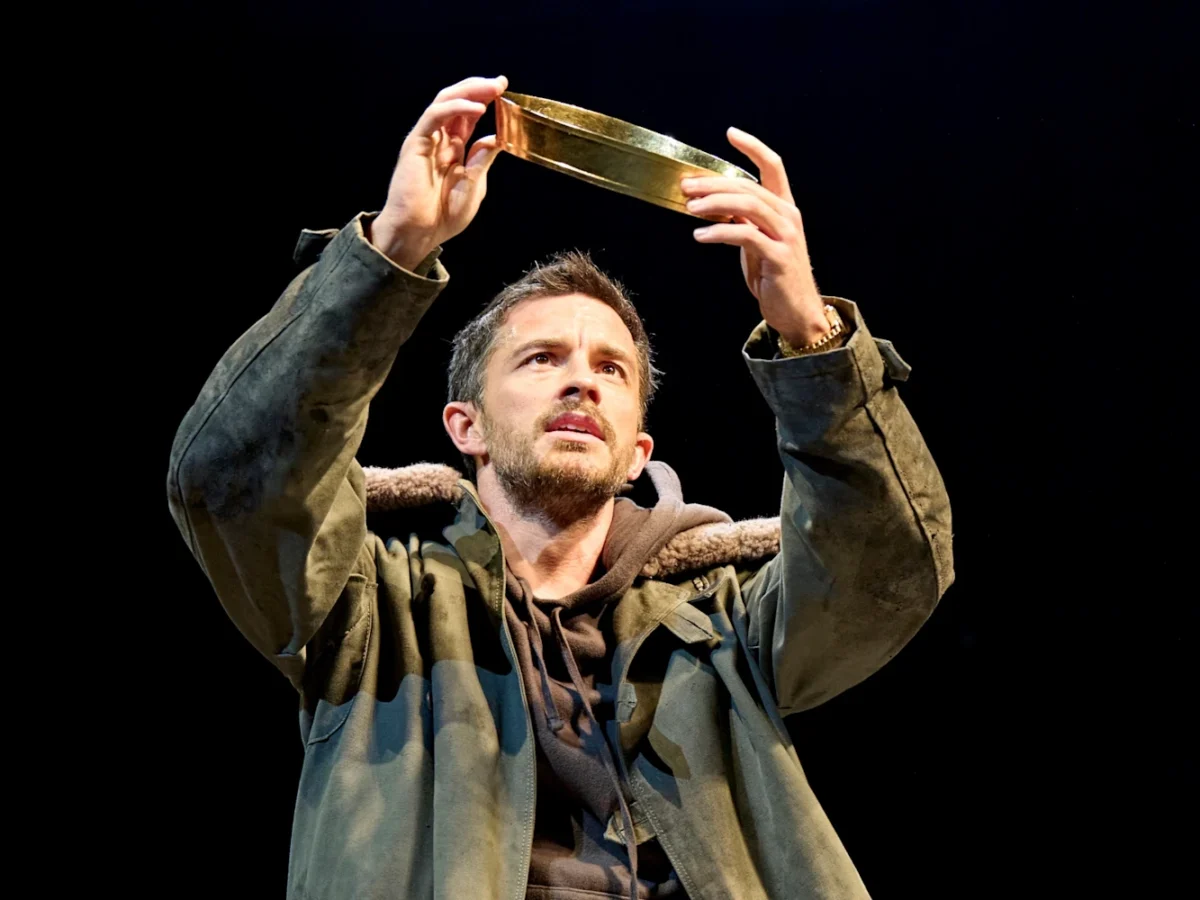
The tinkling piano music that underscores the opening moments of Nicholas Hytner’s modern-dress production of Shakespeare’s Richard II is strongly reminiscent of the theme music from HBO’s mega hit, Succession. The musical reference is no doubt intentional given the play’s theme of a king being deposed – unwillingly passing his crown to the usurper, Henry Bullingbrook, ably played by Royce Pierreson. And while the Bard’s Elizabethan script is largely intact, the evening is infused with multiple contemporary allusions. The cocaine-snorting Richard is vain and impetuous, and his self-proclaimed divine right to rule may resonate with audiences familiar with a certain contemporary US president. When characters throw down their ‘gage’ – originally a glove representing the pledge of one’s honour and commitment – Hytner’s characters throw down their blue British passports.
The cast is led by Jonathan Bailey, who also portrays the heartthrob and heir apparent in the Bridgerton TV series and the sensitive character Fiyero in the film version of Wicked. Bailey’s Richard is a showman who is grandiose and full of self-importance. Sometimes referred to as the “actor king” in scholarly and critical circles, Shakespeare’s Richard portrays a monarch who is out of touch with himself. The king is shown to perform his role rather than inhabit it with authority and authenticity. In a key dramatic moment of being royally dethroned, Richard asks for a mirror to watch his face undergo the humiliation. But in this production, it is difficult to determine when Bailey the star ends, and his performance as Richard the king begins. The confusion is even more obscured by the audience – at least on the night I saw the performance – that was clearly mesmerised by experiencing a TV star in the flesh. Audience members, particularly young women, laughed at scenes that are not meant to be funny, and tittered approvingly at various moments throughout the evening.
Richard’s final prison scene is when he finally comes to term with the tragedy of his performative life. It can be a profound moment when the king discovers a deep humanity and humility. The scene can be deeply moving, poignant, and insightful as Richard discovers his humanity, not just his royal personage. Yet here, Bailey falters. The prison soliloquy—one of Shakespeare’s most psychologically complex passages—calls for a kind of spiritual nakedness. It is a moment where performance gives way to truth, where Richard must confront the terrifying question of who he is without title or audience. Bailey’s delivery, though technically proficient, felt emotionally shallow, and lacked the gravity it might have had with a more inward-facing performance. The vulnerability was hinted at but not embodied. As a result, the transformation never quite landed, and the play’s final moment of self-discovery and character transformation was sadly squandered.
There are numerous delightful performances and scenes throughout the evening. Particularly amusing, yet grounded in true anguish, were the scenes where The Duchess and Duke of York (Amanda Root and Michael Simkins) plead on behalf of their treasonous son, The Duke of Aumerle (Vinnie Heaven). Badria Timini brings a steely core to the role of The Bishop Carlisle, and Nick Sampson as John of Gaunt, representing the old order, takes delight in speaking the truth to Richard.
The clever set by Bob Crowley uses the hydraulics of the Bridge’s stage to its full effect. From beneath a black box platform that runs the length of the Bridge’s pit space, characters in hospital beds, or behind a desk, or at a bar, rise silently and seamlessly into view, and then descent again. Carolyn Downing’s sound design helps pinpoint us in various locals.
By: William Shakespeare
Directed by: Nicholas Hytner
Cast includes: Jonathan Bailey, Phoenix Di Sebastiani, Vinnie Heaven, Royce Pierreson, Amanda Root, Michael Simkins, Badria Timimi
Designer: Bob Crowley
Until:10 May 20125

